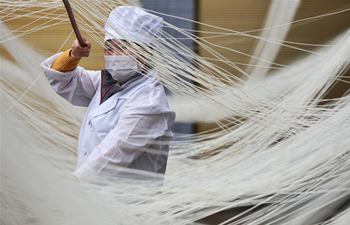
Kobe Steel CEO Hiroya Kawasaki (C) bows during a press conference held in Tokyo, Japan, March 6, 2018. Kobe Steel Ltd. said Tuesday that its chief executive officer will resign to account for the firm's string of data fabrication scandals. The scandals have had a wide-reaching impact on industries both domestically and internationally and sullied the reputation of manufacturers in Japan amid a slew of other quality control scandals, industry insiders have maintained. (Xinhua/Ma Ping)
TOKYO, March 6 (Xinhua) -- Kobe Steel Ltd. said Tuesday that its chief executive officer will resign to account for the firm's string of data fabrication scandals.
The scandals have had a wide-reaching impact on industries both domestically and internationally and sullied the reputation of manufacturers in Japan amid a slew of other quality control scandals, industry insiders have maintained.
At a board meeting held Monday, the resignations of CEO Hiroya Kawasaki, 63, as well as Akira Kaneko, also 63, executive vice president and head of the aluminum and copper business, were provisionally approved.
The embattled steelmaker is expected to pick its new executives as early as next month, sources at the company were quoted as saying Tuesday.
The firm on Tuesday also released its final report on the data fabrication misdemeanors. The report is a result of a lengthy internal probe carried out by a committee comprised of lawyers.
The scandal-mired steelmaker, Japan's third-largest, said in October last year that it had found cases of improprieties regarding inspection data that failed to meet industry inspection standards.
The results of an internal probe initially found that products sold that had their inspection data fabricated were shipped to hundreds of companies.
Japan's quality control authorities subsequently revoked certification for some copper products of a Kobe Steel subsidiary and the Japanese government said it had tasked industrial standards-approved bodies to carry out inspections at Kobe Steel Ltd.'s plants in an effort to deal with the company's wide-reaching falsified inspection data scandal.
Kobe Steel Ltd. had initially admitted to falsifying inspection data on a number of its products, including aluminum, copper, steel powder and special steel products.
It came to light that the embattled steel maker's own investigations had, additionally, revealed cover-ups and more incidents of data falsification thereafter.
Companies ranging from automakers and airplane manufacturers, to defense equipment and Shinkansen bullet train makers, have been affected by the scandal.
Kobe Steel said that its products, with falsified data about their strength and durability, had been sold to around 200 companies globally. Since then the number of affected companies has grown exponentially as details of the scandal have unfolded.
Investigations first revealed that Kobe Steel knowingly shipped at least 20,000 tons of aluminum and copper products with fabricated inspection data. The products were sent to around 200 companies.
The scandal-plagued firm also admitted that an internal probe had revealed that 140 tons of iron powder shipped in fiscal 2016 did not meet customer specifications.
It also said that one of its subsidiaries, Kobelco Research Institute, had falsified data related to the production method of liquid crystal displays, DVDs and other electronic equipment.
In Japan, major railway operators Central Japan Railway and West Japan Railway have stated that their Shinkansen bullet trains contained aluminum parts sourced from Kobe Steel that did not meet industry standards.
Beyond automakers and trains, Kobe Steel has also been implicated in fabricating data for aerospace and defense-related products.
Along with domestic firms such as Toyota Motor Corp., Nissan Motor Co., Honda Motor Co. and major Japanese railway operators, the scandal has also affected overseas companies including General Motors Co., Ford Motor Co., Airbus and Boeing Co.
These companies have been undertaking investigations to see if their products have been adversely affected by Kobe Steel's erroneous data-related practices.
Based on this, the U.S. Department of Justice ordered Kobe Steel to handover documents relevant to the data falsification scandal.
Kobe Steel was founded in 1905 and has been a bastion of Japan's manufacturing sector.
The revelations of the data fabrication scandal, however, have cast doubts over corporate governance in the manufacturing industry and beyond in Japan, and cast serious aspersions over Japan's once stellar reputation for precision manufacturing, industry experts here said.
Last year saw a slew of scandals related to Japanese manufacturers, including Mitsubishi Materials Corp.'s subsidiaries who were found to have falsified quality data for products used in multiple industries, including in equipment used by Japan's Self-Defense Forces (SDF), which compounded growing concerns about quality control in the manufacturing sector here.
Uncertified safety checks were also found to have been routinely carried out by automakers Nissan Motor Co. and Subaru Corp., which led to extensive recalls.
Last week, Subaru named a new president in a bid to clean up its image following a fresh car inspection scandal.
Kawasaki became CEO at Kobe Steel in 2013 and was known for restructuring its production protocols and adding new revenue streams to the company by enhancing the capacity of some of its minor but profitable businesses.
Kaneko, for his part, was in charge of the aluminum and copper division from 2014. He became executive vice president of the firm in 2015.















